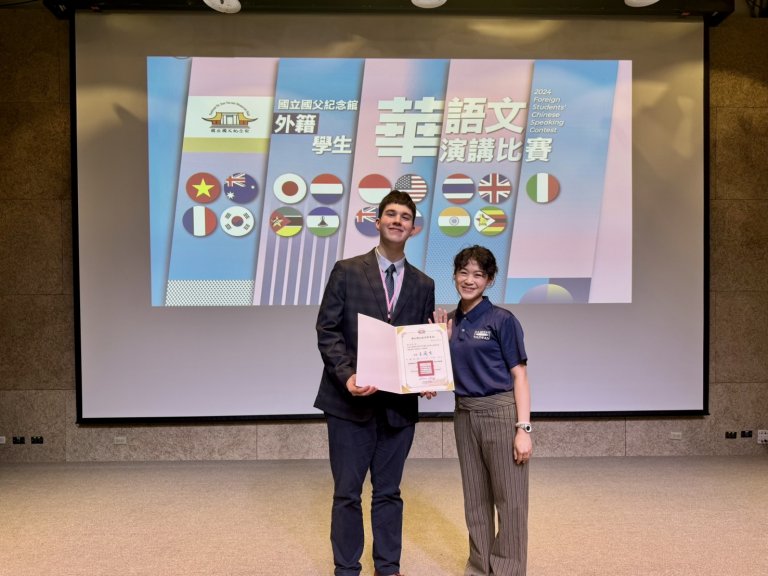For most Chinese language learners, their primary goal is to use the language effectively in daily conversations. In such conversations, the ability to understand and provide meaningful content is crucial. However, the quality of content in everyday interactions typically does not need to be high, nor does it require well-structured delivery. Furthermore, everyday conversations often involve only a small audience, limiting the pressure on the speaker. For learners who aim to boost their speaking ability in a short time and produce meaningful, intriguing, and well-structured content, participating in a speech contest is one of the fastest and most effective ways to achieve this.

Overcoming Misconceptions About Speech Contests
Many students believe that participating in a Chinese speech contest requires an advanced level of proficiency. However, with the guidance of a professional Mandarin instructor, even intermediate-level students can successfully compete and win prizes. This article will outline several strategies instructors can use to prepare intermediate learners for a speech contest.
Creating a Safe Learning Environment
First, the instructor needs to create a safe and supportive learning environment. It is crucial to help students understand that making mistakes—even repetitive ones—is a natural part of the learning process. By fostering an atmosphere of encouragement, instructors can build students’ confidence and help them confront their fears with a positive mindset.
Creating a safe space also involves providing constructive feedback rather than criticism. Instructors should highlight the student’s strengths while addressing areas for improvement. This balanced approach motivates learners to work harder without feeling discouraged. Encouraging peer support within the classroom can further contribute to a positive learning environment. When students feel supported by their instructor and classmates, they are more likely to take risks and step out of their comfort zones.
Providing Exemplary Models
Second, instructors should provide good examples of successful speeches. Sharing videos or transcripts of previous speech contest winners allows students to analyze what makes a speech effective. Instructors can guide students in drawing mind maps to dissect the structure of these speeches. This helps learners understand what a well-structured speech looks like and how to organize their ideas effectively.
By watching these examples, students will also observe that confidence on stage is a key factor in success. Additionally, students who previously believed that pronunciation was secondary will recognize its importance. Clear and accurate pronunciation is essential to maintain audience engagement and avoid misunderstandings. Without it, listeners may struggle to follow the speech, leading to a loss of interest.
Analyzing exemplary models also allows students to see the use of rhetorical devices such as metaphors, anecdotes, and repetition. These elements make a speech more compelling and memorable. By integrating these techniques into their own speeches, learners can elevate their performance and leave a lasting impression on the audience.
Crafting a Speech Draft
Once students understand the elements of a good speech, the next step is teaching them how to create a draft. There are three critical aspects to address:
- Understanding the Venue: Knowing the competition site can help reduce anxiety. If possible, instructors should take students to visit the venue in advance. If this is not feasible, providing photos or creating a similar environment during practice sessions can achieve the same effect.
- Knowing the Audience: Tailoring the speech to the audience establishes a connection and ensures the topic is relevant. This approach helps engage the audience and prevents the speech from feeling like a lecture.
- Mastering the Content: Familiarity with the speech content is vital. Students should practice extensively to ensure they can deliver their speech smoothly and confidently on stage.
Before students memorize their speech, instructors should help them craft high-quality content. A well-structured speech typically includes:
- An engaging opening: This can involve a direct approach, a self-questioning technique, or a compelling story to capture the audience’s attention.
- A meaningful main body: Personal stories that resonate with the audience’s experiences can make the speech more relatable and memorable.
- A unique and insightful conclusion: Avoid clichés and aim for originality to leave a lasting impression. Always thank the audience for their time and attention.
Practicing Delivery
After finalizing the speech content, the focus shifts to practice. During the initial practice sessions, instructors should identify recurring mistakes, such as overly high fourth tones or insufficiently deep third tones, and address them one at a time. Correcting one issue at a time helps students concentrate and prevents them from feeling overwhelmed.
Pronunciation is not the only aspect to refine. Proper sentence segmentation, including when to pause and stop, is equally important. Instructors can provide audio recordings of the speech and encourage students to listen repeatedly, imitating native speakers’ delivery. Body language also plays a vital role in enhancing the speech. Incorporating appropriate gestures and facial expressions makes the presentation more dynamic and engaging. Additionally, instructors should encourage students to infuse their speech with genuine emotions to connect with the audience more effectively.
Another effective technique is to practice in front of small groups of peers. Peer feedback can provide valuable insights and help students identify areas for improvement that they might have overlooked. Practicing in front of others also helps build confidence and reduce stage fright.
Simulated Competitions
Before the actual contest, hosting a simulated competition can help students prepare and gain valuable feedback from other instructors. This simulation should occur about three days before the competition. Afterward, at least one additional practice session should be held to make final adjustments.
During the simulated competition, feedback should be constructive, realistic, and encouraging. Gathering insights from qualified instructors ensures students receive diverse perspectives, enabling them to refine their performance further.
Simulated competitions also allow students to experience the pressure of performing in front of an audience. This exposure helps them manage nervousness and adapt to the contest’s environment. Instructors can simulate potential challenges, such as unexpected technical issues, to prepare students for any situation.
Enhancing Stage Presence
Stage presence is a crucial aspect of delivering a successful speech. Instructors should teach students how to use the stage effectively, including where to stand, how to move naturally, and how to make eye contact with the audience. Maintaining good posture and projecting confidence through body language can significantly impact how the speech is received.
Additionally, students should learn to modulate their voice to emphasize key points and maintain the audience’s interest. Varying tone, pitch, and pace adds dynamism to the speech and keeps the audience engaged. Practicing vocal exercises can help students improve their articulation and projection.
Managing Time Effectively
Time management is another critical skill for speech contests. Instructors should ensure students stay within the allotted time while covering all key points. Practicing with a timer can help students gauge the length of their speech and make necessary adjustments. Overrunning the time limit can detract from the overall impression, while finishing too early might suggest a lack of content.
Building Emotional Resilience
Participating in a speech contest can be emotionally taxing. Instructors should help students develop resilience by teaching them how to handle criticism and setbacks. Emphasizing that every mistake is an opportunity for growth can shift their perspective and reduce performance anxiety.
Role-playing different scenarios, such as receiving tough questions from the judges or handling technical issues, can equip students with the tools to navigate challenges confidently. Encouraging a growth mindset helps students view the contest as a learning experience rather than a high-stakes performance.
Final Preparations
By following this structured approach, students can be ready to participate in a speech contest within 1.5 months. Practice is key to perfecting their performance. Instructors should provide unwavering support and instill the belief that challenges make life interesting and overcoming them makes life meaningful.
Before the contest, it is essential to revisit the speech content and make any necessary adjustments. Instructors should encourage students to stay calm and focused, reminding them that their preparation has equipped them to succeed. Providing motivational support can boost their confidence and help them approach the contest with a positive mindset.
Beyond the Contest
Even after the competition, the benefits of participating in a speech contest extend far beyond the event itself. Students gain enhanced public speaking skills, improved confidence, and a deeper understanding of effective communication. These skills are invaluable in both academic and professional settings.
Instructors can encourage students to reflect on their experience by writing a journal entry or discussing their journey in class. This reflection helps solidify the lessons learned and allows students to appreciate their progress. Furthermore, students can serve as mentors for future participants, sharing their insights and inspiring others to take on the challenge.
Conclusion
Guiding intermediate Chinese learners to participate in a speech contest not only enhances their language proficiency but also fosters confidence, creativity, and resilience. The experience can be transformative, equipping learners with skills that extend beyond language and enriching their personal and professional lives.
Speech contests provide learners with a platform to showcase their abilities and push their limits. By creating a safe learning environment, providing exemplary models, teaching drafting techniques, and emphasizing practice, instructors can help students achieve remarkable results. The journey of preparing for a speech contest is not just about winning; it’s about growth, self-discovery, and realizing the power of effective communication.





